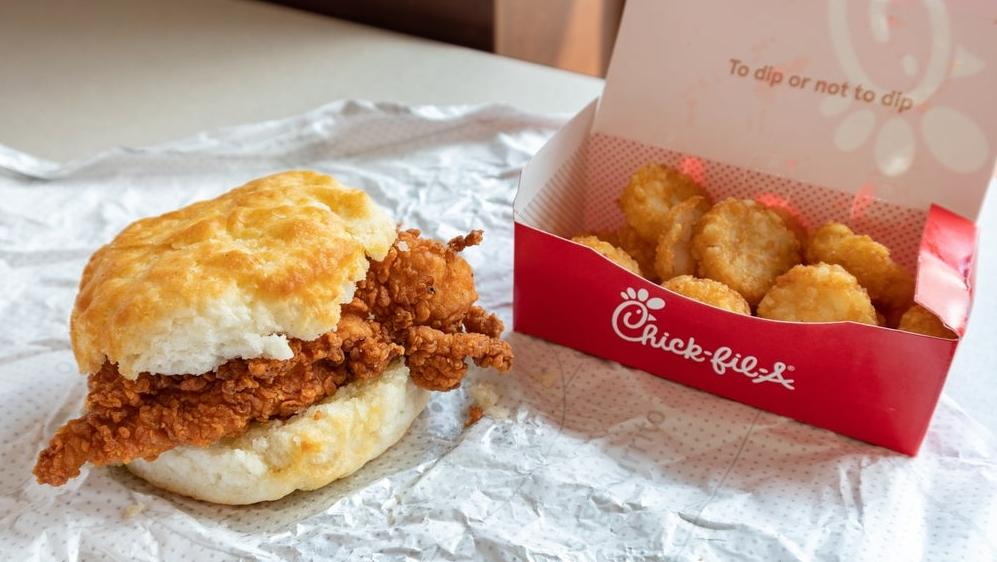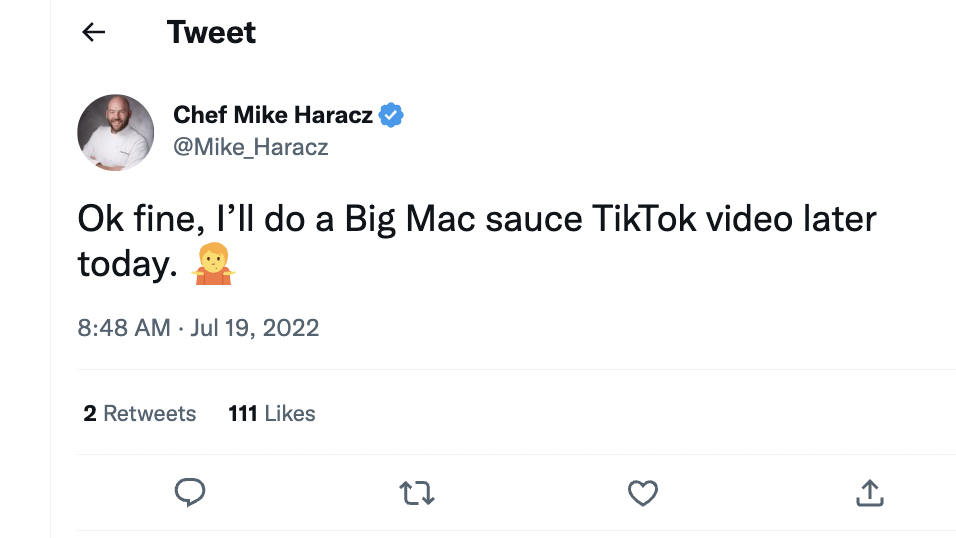10 Of The Biggest Food Moments Of 2022
This year's top trends and shocking developments that captivated us all.
It's been a tumultuous year for food, hasn't it? As restaurants continue to feel the squeeze in the post-pandemic landscape, the industry's latest innovations are seemingly all geared toward a tech-heavy and solitary future—one we hope they're incorrect in assuming. Whatever the case, we noshed our way through a year full of changes, some of which were fantastic while others were tragic. Here are the The Takeout's top 10 most widely read and shared news stories of 2022, encapsulating all that we ate and the ways in which we ate it.
10. Taco Bell’s Mexican Pizza returns
May 19 was a big day in fast food—the day that the Taco Bell Mexican Pizza returned after a nearly two-year absence from the menu. Initially a victim of COVID-era menu-streamlining, the "pizza" (a double-decker tostada filled with meat, beans, cheese, and sauce) returned in a blaze of glory, then quickly sold out everywhere, then returned again in September with the help of a promotional TikTok musical heralding its reinstatement to the menu. Now that it has finally settled into its spot among Taco Bell's specialties, the Mexican Pizza seems less likely to make headlines. But for a while, it was all anyone wanted to talk about.
9. Restaurants plagued by scammers
This was a rough year for restaurants in all kinds of ways—staffing shortages, inflation—but on top of it all, a few new scams rocked these businesses across the country. In one new type of scam, the scammer would lower a restaurant's overall ratings on Google by flooding it with one-star reviews. The restaurants then receive an email from the bad actor saying that the bad reviews can all be deleted, as long as the restaurant sends the scammer Google Play gift cards as a sort of ransom.
But it's not just online trolls—restaurants are being bilked by third-party delivery apps, too, and in a few different ways. Sometimes a scammer will pose as a real restaurant on DoorDash, posting an identical menu and simply pocketing the money from orders rather than fulfilling them with any food. This means delivery drivers head to the real restaurant demanding to pick up orders that never really existed, and which the restaurant knows nothing about. And Uber Eats and Postmates have gone so far as to add restaurants to the platforms without the businesses' consent, driving a demand that's not always sustainable for the restaurants. In short, it's tough out there for restaurant owners, and we hope that is less true in 2023.
8. Fast food chains restructure their rewards programs
Mobile apps are a great way for fast food chains to spur repeat visits, but these brands really seem to hate the part where they actually have to let customers redeem all those loyalty points they rack up from their orders. Dunkin's solution was to basically make its rewards points worth less, requiring customers to spend $50 to earn a free coffee instead of the previous $40.
Starbucks, meanwhile, has said it wants to change its Rewards program to become something of an all-purpose credit card points builder, letting you earn Stars at other retailers or on purchases like airline tickets. This would inevitably make our data available to additional parties, but there are plenty of customers who would see that as a fair trade for the convenience.
7. Cracker Barrel serves customer a cup of chemicals
So technically, Cracker Barrel poisoned a customer back in 2014, not 2022—but this is the year that the business had to pay dearly for the mistake. Eight years ago, a customer dining at a Cracker Barrel in Tennessee was served what he thought was ice water, but a sip of it burned his mouth and throat; it was discovered that the cup was full of Eco-San, a heavy-duty chemical that was being used to clean the kitchen.
The case wrapped up in January 2022; Cracker Barrel was ordered to pay $4.3 million in compensatory damages and $5 million in punitive damages. Cracker Barrel said it was "obviously disappointed" in the jury's decision and reminded the media that this was "an unfortunate and isolated incident that occurred at one of our stores eight years ago."
6. McDonald’s chef reveals the secrets of Big Mac sauce
Mike Haracz, a former McDonald's corporate chef, is a valuable TikTok follow, always dropping knowledge about fast food. And he stunned us all this year with his big reveal about Big Mac sauce: there's not so much as a hint of ketchup in it. The "secret" recipe for the mayo-based sauce involves a combination of Düsseldorf mustard and white wine vinegar. The pink hue isn't from ketchup; it's just a small dose of paprika, which acts as a coloring agent and boosts the overall flavor. Shockingly, this condiment is a bit more complex than we thought.
5. Popeyes’ new chicken sandwich shifts the Chicken Sandwich Wars
Popeyes announced in November that it was releasing yet another chicken sandwich, but unlike the one that put Popeyes on the map in 2019 (and spawned a thousand imitators), this new version has no breading at all. The Blackened Chicken Sandwich is indeed fried, but has none of the crunchy, craggy crust we associate with a chicken breast filet deposited on a bun with some mayo and pickles. Instead, it relies on its spice profile to entice customers, a trend we hope other fast food joints see fit to copy in 2023.
4. Grocery shoppers treated like criminals everywhere they go
ALDI stores in the UK were called out this summer for outfitting items such as cheese and meat with the type of security tags and plastic anti-theft devices usually reserved for expensive electronics and apparel. Though this is in part a response to the UK's historic inflation, it's happening in the States, too: locking grocery carts are a growing trend at supermarkets, only able to leave the store once they've passed through a checkout lane (yes, even if you didn't buy anything). Loss prevention is the reason cites for these changes, but it stands to reason that once the vast majority of items at the grocery store are behind glass, only able to be accessed with the help of an attendant, then we've lost out on what grocery shopping has always been: a chance to wander, to select, to zone out, to enjoy our status as consumer. By 2024, will all shopping be window shopping?
3. Uber Eats and Snoop Dogg have a fight
This spat between a celebrity and a third-party food delivery app is one of those situations where everyone involved was wrong in their own special way. Here's what happened, according to a now deleted Instagram post from Snoop Dogg: the rapper ordered food from Uber Eats, but it never showed up. When he pressed the delivery driver about his order, the driver allegedly refused to drop it off, texting, "this is not a safe place." Snoop put Uber Eats on blast and called the driver a "punk." In response, Uber Eats apologized to Snoop, spurring the delivery driver to consider retaliation against Snoop because the Instagram post included the driver's name, photo, and license plate, all of which amount to a threat to his privacy. Whew! Seeing all the ways it can go wrong, wouldn't it be simpler to just forego third-party delivery altogether?
Seemingly everyone had opinions on this news story in 2022. Hopefully the attention made Snoop Dogg think twice about posting through it.
2. Klondike discontinues the Choco Taco
This year, we lost a real one. The Klondike Choco Taco, stalwart of gas station freezer chests and ice cream trucks everywhere, was quietly discontinued in 2022. We were certain that it was nothing more than a short-lived gimmick, a chance for the company to resurrect the Choco Taco to much fanfare on National Taco Day. But... nope. Crickets. The frozen novelties continue to sell on eBay and delight the masses as the national supply dwindles, but there will soon come a day when every last Choco Taco is gone. Perhaps when that day comes, Klondike will hear our pleas and see fit to bring them back.
1. Chick-fil-A tests a three-day work week
Fast food workers have been given a raw deal in this country for far too long, so when any franchise even attempts to disrupt the status quo, Americans sit up and take notice. That is, evidently, why our story about a Miami Chick-fil-A experimenting with a three-day work week was read and shared by so many people this year.
The model that Chick-fil-A is testing doesn't actually reduce the number of hours worked, but instead condenses a week's worth of shifts into three days, with 13- to 14-hour shifts and then at least four days off each week. There are pros and cons, of course: there's lots more time on one's feet, and it might be harder to shift one's schedule as the need arises. But there are also fewer days to arrange childcare and more time to run errands on days off. Since introducing the three-day work week, this Chick-fil-A location has seen high application rates and a 100% manager retention rate. Whether it would be beneficial on a national level remains to be seen, but in 2022, we got a glimpse of what it looks like to try something different.

